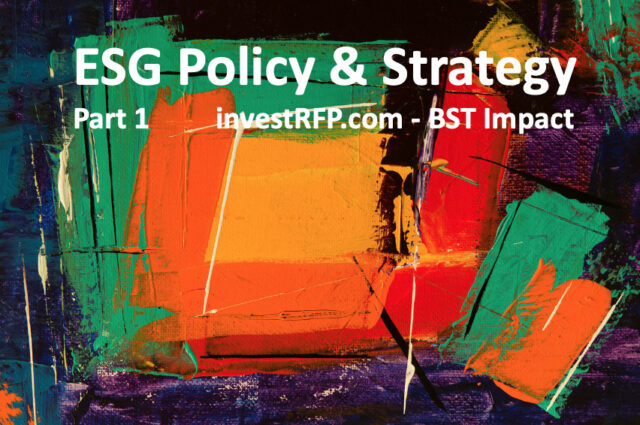By Kristina Touzenis, Managing Partner BST-Impact
| ESG Policy & Strategy
What is a good sustainability strategy and why on earth would you need it? One example is that your are based, or operate, or work with, or invest in, an EU based entity. You may want start asking yourself the following – basic – questions:
1 Has your company adopted a written ESG/Sustainability investment policy/strategy? How you ensure effective engagement with investees so that you do not operate on exclusion but rather on engagement for sustainability based on concrete indicators and goals? Have you thought about the “implicit” strategy you may already have in place?
2 Does your company consider sustainability/ESG as an integral part of your risk management? Are you ready to report meaningfully on Sustainable Finance Disclosure Requirements – including knowing when questions are truly non-applicable or ready to disclose when you are yet to obtain information?
3 Do you have practical and pragmatical indicators on ESG/Sustainability which are linked to your strategy and which truly readies you for reporting on e.g. SFDR and other such regulation? Do your strategy and indicators allow you to capture small progress that your investees make on sustainability issues?
4 Have you committed to a strategy addressing effects – positive and negative – on the societies of your investments? Do you have indicators based on international norms and SDGs which pragmatically aid you in your reporting and in making certain that you do no harm – or if you adhere to “implementing the SDGs” in your reporting you actual do so?
5 Have you considered that by asking these questions of your Asset Manager (perhaps not on ALL AUMs in one go!) you can deduct an implicit sustainability policy/strategy which may already be rather well developed? And with confidence say „this does not apply to us“ or „we are seeing this as an area to focus on“ once questionnaires start arriving?
Why do asset owners need a good sustainable investment policy and strategy?
Because very soon you will be asked to disclose on these issues. And it will be very good to know if not all, at least some of the answers – and also know why you do not HAVE some of the answers YET – as well as what questions simply do not apply to you.
| ESG Portfolio Screening
Doing an initial screening of your asset managers portfolio, based on their policies and strategies but also looking into their investees actual ESG footprint, based on international standards which are at the basis of the SDGs and WILL BE the BASIS for ANY regulation coming from regional or national regulatory bodies.
Asset owners can start to paint a picture of an implicit sustainability policy/strategy which may actually be much more elaborate than what is on paper, as well as discover the areas to work on.
Importantly the knowledge this will give you, will allow you to say “this does not apply to me” once massive questionnaires start coming your way, as well as say with confidence where you are focusing on improving”
This article is the Part 1 of a series on “ESG Policy & Strategy”
Part 1: Why asset owners need a good sustainable investment policy and strategy?
Part 2: SFDR aims at preventing greenwashing and ensuring data comparability
Part 3: Working towards the SDGs – at 360 degrees
Part 4: Due Diligence, Supervision and Enforcement Mechanisms
Part 5: Bringing down to “Earth”
Part 7: ESG as a real sustainability tool
Part 8: Awareness and attention towards rights and starndards
Part 10: ESG Policy & Strategy – Key Questions
Expert/Specialist Feedback on investRFP | Kristina Touzenis | BST-Impact
| about
Kristina Touzenis is the Managing Partner of BST Impact. A lawyer and a recognized leader in the effective and concrete operationalization of international human rights standards and principles in complex settings worldwide requiring long-term engagement with a multitude of stakeholders, form both the public and private sectors. She has more than 20 years of experience in advocacy, human rights reporting, monitoring, and evaluating as well as in policy making and negotiating at national, regional, and global level. Kristina founded BST Impact with two other partners in mid 2020, together with a pool of experts to help companies and investors to effectively operationalize ESG criteria, SDGs, international norms and the Business and Human Rights agenda into their respective sustainable business strategies, investment processes and risk assessment management systems. Previously, Kristina created the International Law Unit at the International Organization for Migration – IOM, the UN Agency for Migration and served as Head of the Unit from 2011 to 2020. She engaged with government counterparties on legislation development and review as well as with other Agencies within the UN common system, on advocacy and implementation of programmes worldwide. Prior to her appointment at the IOM HQ, Kristina worked from 2006 to 2011 in the IOM Regional Office for the Mediterranean Region, on translating international norms and standards into practice on the ground and from 2002 to 2006 on implementing children’s rights in the Mediterranean Region for an NGO.
| All opinions expressed are those of the author. investESG.eu is an independent and neutral platform dedicated to generating debate around ESG investing topics.







